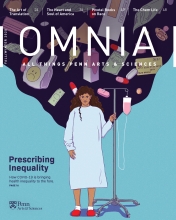Looking Back—and Moving Forward
A message from editor Blake Cole
As we near the end of a tumultuous 2020, we recognize students and faculty for all the new and creative ways they’ve adapted to virtual learning, teaching, research, and outreach. Whether it’s the 30-year-old Center for Africana Studies Summer Institute for Pre-Freshmen fostering a sense of community through online discussions and virtual game nights, or an undergraduate working as a virtual camp counselor creating digital spaces for young community members to talk about civic engagement, Arts & Sciences students and faculty have remained committed to making a difference.
Our faculty have long been leaders in research on racial injustice and inequality. In “Prescribing Inequality,” we speak with a collection of faculty experts about the disproportionate impact of the pandemic on racial minorities and low-income workers; the health effects of policy, race, and socioeconomic status on COVID-19 exposure and prognosis; and the historical roots of racialized medicine. And in “Dialogue, Revisited,” we look back on books from three faculty whose contributions to the conversation on race and social justice have stood the test of time, on topics from governmental response to protests to reproductive justice to a critique of how racial statistics are used in the social sciences.
It is also an election year, and to this end, we take a journey with a political volunteer turned teacher and scholar who is “searching for the heart of America” in “We, the People,” and examine how political rhetoric informs civic participation. Another career retrospective, “Agent of Change,” highlights a chemist who has left an indelible mark on her specialty, her institution, and in the lives of her students, and in “Lost and Found,” we explore translation as an art that allows us to communicate across cultural difference.
Our scholars continue to contribute to research and discourse on COVID-19. Hubs of critical thinking, like the Undergraduate Data Science Hangout, see faculty and students connecting on topics like using mathematical models to simulate the spread of COVID-19 on college campuses. And research on how new social norms are developing fosters knowledge on how the pandemic is impacting society.
We recognize that the year ahead will bring more changes, but we are as confident as ever that Penn Arts & Sciences is well-positioned to advance understanding on the challenges of our time.



